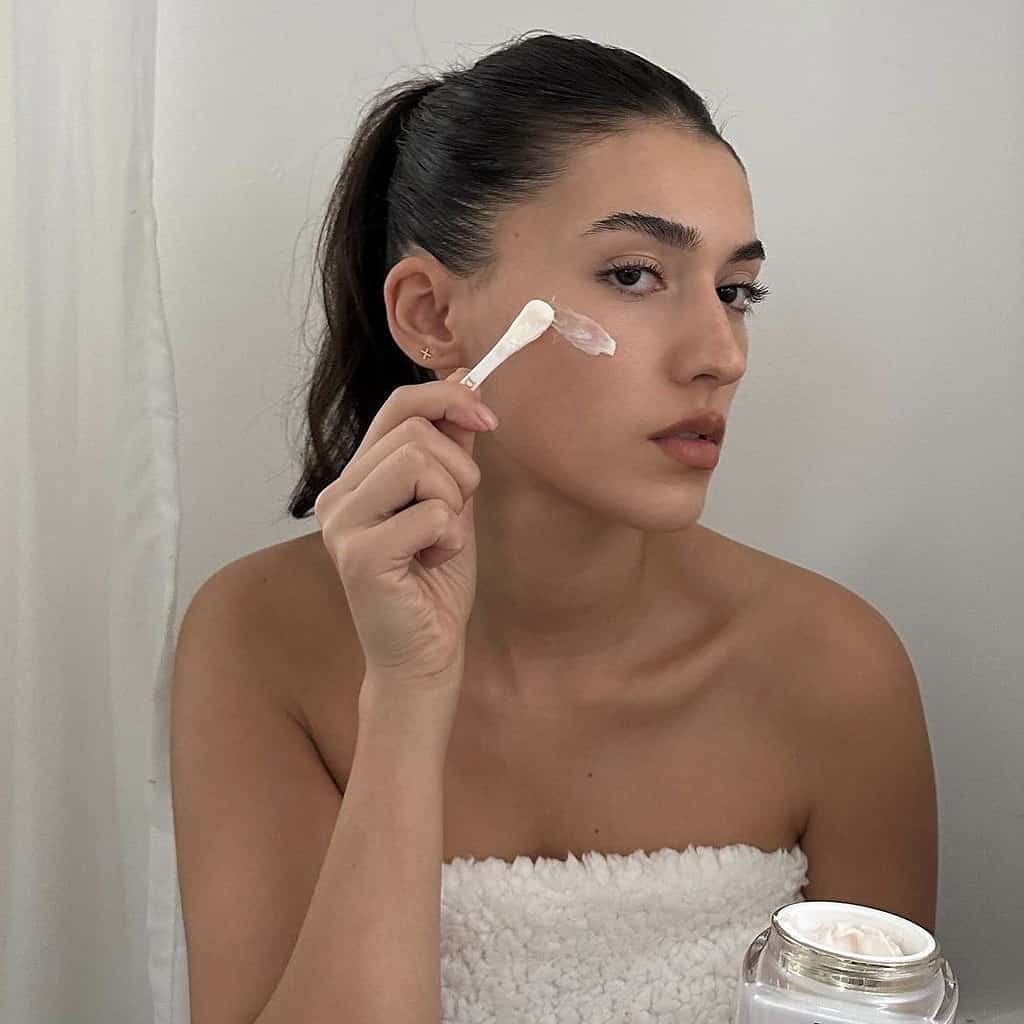picture via pinterest
if you’re unsure about your skin type take this quiz first! Otherwise, keep scrolling.
For many, skin care is a part of their daily routine to achieve healthy and radiant skin.
Did you know that according to your specific skin type, you can optimize your routine and improve your results?
First, you need to understand your skin type.
I will discuss the four skin types: oily, dry, combination, and sensitive.
Now let‘s talk about how to identify your skin types, specific advice, and routines designed for your skin.
1. Oily Skin
Your skin type:
With this skin type your sebaceous glands tend to produce excess sebum, the skin‘s natural oil which leads to a shiny complexion, and frequent breakouts. Oily skin tends to have a thicker texture and larger pores as well.
To manage oily skin it‘s important to maintain balance and control oil production.
Your routine:
-
- Apply a gentle cleanser to effectively remove impurities without stripping away natural oils. Opt for ingredients like salicylic acid or tea tree oil which are known for their antibacterial and oil-controlling properties.
- Use an alcohol-free toner with ingredients like witch hazel or rose water to help tighten pores and control sebum production.
- To keep the skin hydrated use an oil-free, lightweight moisturizer to hydrate without clogging pores. Opt for gel-based formulations or products with hyaluronic acid.
- Weekly exfoliation and a clay mask can provide many benefits like unclogging pores or removing dead skin cells which can lead to breakouts. Opt for chemical exfoliants like salicylic acid or glycolic acid.
Additional Tips:
-
- Don‘t overwash your face since it can stimulate more oil production.
-
- A balanced diet rich in fruits, vegetables, and omega-3 fatty acids can also benefit your skin health.
-
- Don’t unnecessarily touch your face as it can transfer dirt and oil to your skin.

picture via pinterest
2. Dry Skin
Your skin type:
Dry skin lacks moisture and struggles to retain it. The skin often feels tight, rough and might appear dull and flaky. Contributing factors to this dryness can be genetics, environmental conditions, aging, and excessive bathing or harsh cleansing routines
Your routine:
-
- Apply a gentle cleanser that doesn‘t take away any natural oils from the skin. Use mild, fragrance-free cleansers specifically designed for dry or sensitive skin. Hot water can further dehydrate the skin so avoid hot temperatures and aim for lukewarm water while cleansing.
- Since toners play a key role in this skincare routine opt for alcohol-free toners that are hydrating and soothing with ingredients like rose water, chamomile, or aloe vera. These can help replenish the skin’s moisture, restore pH balance, and provide a soothing effect.
- For moisturizing choose a rich, nourishing moisturizer that contains emollients (like shea butter or plant oils to help soften and smooth the skin), humectants (like glycerin or hyaluronic acid to attract moisture), and occlusive agents (like petrolatum or dimethicone to create a protective barrier, preventing moisture loss)
- Consider adding hydrating serum or facial oil to your routine for extra nourishment.
- Applying hydrating masks once or twice a week can provide an intensive moisture boost for dry skin. Look for masks with ingredients like hyaluronic acid, aloe vera, or ceramides.
- For exfoliation choose gentle exfoliators like chemical exfoliants with lactic acid or fruit enzymes, which dissolve dead skin cells without harsh scrubbing. Be cautious not to over-exfoliate, as it can further irritate and dry out the skin
Additional Tips:
-
- Stay hydrated.
-
- Use a humidifier to add moisture to the air, especially during dry seasons or in heated indoor environments.
-
- Avoid long exposure to hot water and harsh soaps.
-
- Eat a balanced diet rich in fruits, vegetables, and healthy fats.
3. Combination Skin
Your skin type:
Your skin type is characterized by an oily T-zone (forehead, chin, and nose) and drier cheeks. Accordingly, your skincare routine should serve both areas.
Your routine:
-
- For cleansing use a gentle cleanser that removes excess oil and impurities from the T-zone without stripping the cheeks of their natural moisture. The best would be a pH-balanced cleanser containing ingredients like salicylic acid or tea tree oil.
- Look for alcohol-free toners with ingredients like witch hazel, rose water, or green tea that can help restore pH balance, tighten pores, and provide a refreshing sensation.
- Choose lightweight, oil-free moisturizers and apply a slightly thicker layer to the cheeks and a lighter layer to the T-zone to cater to the different needs of each area. In terms of ingredients look for formulas containing hyaluronic acid, aloe vera, or jojoba oil. You can also consider using different moisturizers for different areas of your face to cater to specific needs.
- For combination skin, it’s important to address specific concerns to maintain balance. Since T-zone is prone to breakouts, consider using targeted treatments with ingredients like benzoyl peroxide or tea tree oil. For dry skin on the cheeks, opt for hydrating serums or masks containing ingredients like hyaluronic acid or ceramides.
Additional Tips:
-
- Exfoliate regularly to remove skin cells and unclog pores.
-
- Avoid harsh drying products or overuse acne treatments since they can cause more dryness and irritate the skin
-
- Maintain a balanced diet, drink plenty of water, and manage stress levels.

picture via pinterest
4. Sensitive Skin
Your skin type:
Your skin is prone to redness, itching, or burning sensations. It tends to react easily to skin care products or environmental factors like the sun.
Your routine:
-
- Look for a gentle cleanser that‘s specifically formulated for sensitive skin and is fragrance-free. Opt for hypoallergenic cleansers as well; these are products designed to be less likely to cause allergic reactions. Consider cleansers with soothing ingredients like aloe vera or chamomile. These ingredients help calm and nourish the skin.
- For sensitive skin use alcohol-free and fragrance-free toners with ingredients like rose water, cucumber extract, or calendula that can provide a calming effect while helping restore the skin’s pH balance.
- Moisturizing is key since it hydrates the skin and strengthens its protective barrier. Use a gentle, fragrance-free moisturizer with ingredients like ceramides, hyaluronic acid, or colloidal oatmeal, which help retain moisture and soothe the skin.
Additional Tips:
-
- Avoid abrasive scrubs and opt for gentle exfoliation methods like chemical exfoliants or enzymatic peels.
-
- Before using new products in your routine, do a patch test. Apply a small amount of the product on a small area of your skin and observe your skin‘s reaction. This will help you identify any potential triggers or allergies before applying the product to your entire face.
-
- Read product labels carefully. Steer clear of products containing fragrances, alcohol, sulfates, artificial colors, and harsh preservatives.
-
- Avoid excessive sun exposure, protect your skin from harsh weather conditions, and manage stress levels.
Overall Tips For Every Skin Type
- Use at least SPF 30 to protect your skin from harmful UV rays because it‘s essential to prevent premature aging and reduce skin cancer risk. Incorporate it into your skincare routine and if needed adjust to your skin type.
- Be consistent. As with almost everything, consistency is key to seeing visible results. Skincare is a long-term commitment that rarely delivers results overnight.
- Diet, Hydration, and Stress Management play a huge role as well. Maintain a healthy diet rich in fruits, vegetables, and antioxidants, and stay hydrated by drinking an adequate amount of water. Manage your stress and avoid excessive alcohol consumption and smoking, especially if you have sensitive skin.
- DISCLAIMER:
Remember, everyone’s skin is unique, so it’s important to listen to your skin’s needs and adjust your routine accordingly. If you’re experiencing persistent issues, or irritation or are generally unsure about what‘s best for your skin, it’s best to consult with a dermatologist who can provide personalized guidance.












